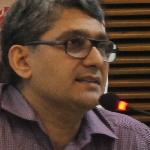 Rakesh Kapoor Jun 14, 2016 04:50 | Proposal contributor India is a large country and every sixth human being on earth is an Indian. Also India is a young country with currently a median age of 27. Indians and especially half the Indians below 27 have a huge stake in mitigating climate change and adapting to the disruptive impacts of climate change. So for the theme of this contest, Shifting Behavior for a Changing Climate, the participation of Indians and young Indians in particular has a huge relevance. This proposal makes a good beginning in identifying that climate change has to be seen in a broader context as a moral and philosophical problem. The required shift in behavior in the context of a changing climate will happen only if people from different streams and sectors of the population are able to relate to it and are able to appreciate the gravity and the novelty of the problem. In this context, the proposed suggestion to create a common climate charter that can link to different ideologies, religions, etc. is highly relevant and innovative. However, I feel that the proposal has to go beyond trying to create a common charter and to bring out a website/blog and online bimonthly magazine. These communication resources by themselves will not suffice for the task at hand. The process of creating the charter has to be seen as a process of public engagement with different constituents of the public such as students, consumers, corporations, journalists, religious leaders, policy-makers, etc. The proposal should include as an explicit activity the outreach to the public on the issues of climate change and particularly focusing on the question as to how the different issues arising out of climate change - such as the question of consumption and lifestyles - can be integrated with other belief systems, perspectives and assumptions of modern living. My organization, Alternative Futures (www.alternativefutures.org.in and www.gencap.org.in) have been working during the last few years on the issues of the impacts of climate change on India's rural communities and women, particularly on their livelihoods (see the website www.gencap.org.in). We have been doing policy research and advocacy on these issues,and training programs for women, to ensure that the very large number of women involved in farming in India are not negatively affected by the impacts of climate change. And we have been working on communicating science in society. We will be happy to collaborate in this project to facilitate public engagement with different constituencies, such as women, youth, urban consumers, students, journalists, etc. |
